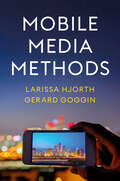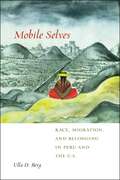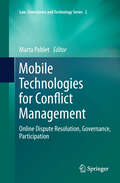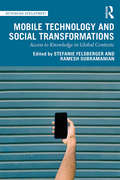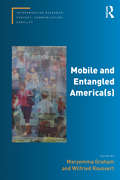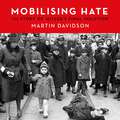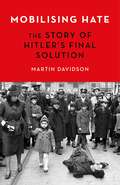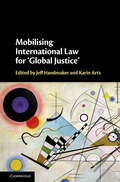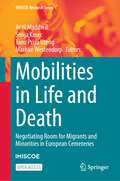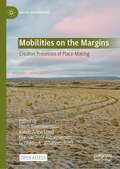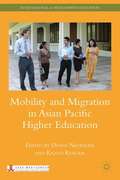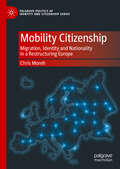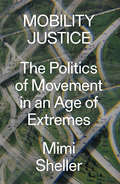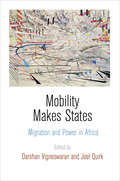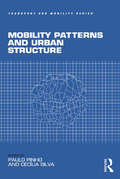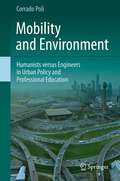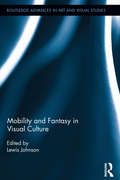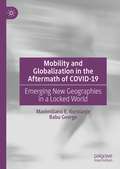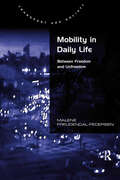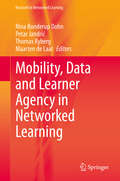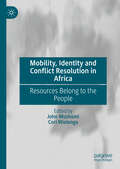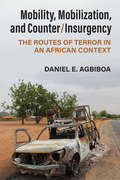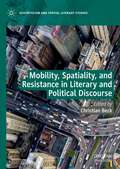- Table View
- List View
Mobile Media Methods
by Larissa Hjorth Gerard GogginMobile media such as smartphones, apps, and social media are an integral part of everyday life, used by billions of people around the world. For students and researchers, mobile media also offer a treasure trove of new concepts, methods, and techniques to do research – representing a new phase in digital methods. Across disciplines, researchers rely upon mobile media for quantitative and qualitative projects, to gather data and document sound and images, engage with participants, and disseminate findings. This is the first textbook devoted to explaining these innovative and groundbreaking mobile media methods. Exploring the opportunities and limitations mobile media offer for methods, the book covers a range of topics from mobilities and placemaking to virtual reality and AI, as well as new kinds of mobility such as e-scooters and connected cars. Student-friendly features such as practical guidance on how to gather and analyse data alongside exercises are also included. Underscoring the book throughout is the definition of methods as not just a series of tools and techniques, but as an invitation to rethink how to conceptualize, practice, study and theorize the relationship between research, data and the field. Drawing from the best of mobile and digital communication research, Mobile Media Methods offers a clear, accessible, and practical guide to mobile media methods. It is essential reading and a useful resource for students and scholars of digital technology and research methods.
Mobile Selves: Race, Migration, and Belonging in Peru and the U.S. (Social Transformations in American Anthropology #3)
by Ulla D. BergAn explanation of how Peruvian migrants maintain meaningful social relations across borders.In this engaging volume, Ulla D. Berg examines the conditions under which Peruvians of rural and working-class origins leave the central highlands to migrate to the United States. Migrants often create new portrayals of themselves to overcome the class and racial biases that they had faced in their home country, as well as to control the images they share of themselves with others back home. Migrant videos, for example, which document migrants’ lives for family back home, are often sanitized to avoid causing worry. By exploring the ways in which migration is mediated between the Peruvian Andes and the United States, this book makes a major contribution to understanding technology’s role in fostering new forms of migrant sociality and subjectivity. It focuses on the forms of sociality and belonging that these mediations enable, adding to important anthropological debates about affect, subjectivity, and sociality in today’s mobile world. It also makes significant contributions to studies of inequality in Latin America, showcasing the intersection of transnational mobility with structures and processes of exclusion in both national and global contexts. A key resource for understanding the experiences of racialized and indigenous migrant populations, Mobile Selves demonstrates the critical role that ethnography can play in transdisciplinary migration studies and exemplifies what comparative migration studies stand to gain from anthropological analysis and ethnographic methodologies.
Mobile Technologies for Conflict Management
by Marta PobletMobile phones are the most ubiquitous communications technology in the world. Besides transforming the way in which we communicate, they can also be used as a powerful tool for conflict prevention and management. This book presents innovative uses of mobile technologies in the areas of early warning, disaster and humanitarian relief, governance, citizens' participation, etc. and cuts across different regions. The book brings together experts and practitioners from different fields--mobile technologies, information systems, computer sciences, online dispute resolution, law, etc.--to reflect on present experiences and to explore new areas for research on conflict management and online dispute resolution (ODR). It also reflects on the transition from present ODR to future mobile Dispute Resolution and discusses key privacy issues. The book is addressed to anyone involved in conflict prevention and dispute management aiming to learn how mobile technologies can play a disruptive role in the way we deal with conflict.
Mobile Technology and Social Transformations: Access to Knowledge in Global Contexts (Rethinking Development)
by Stefanie FelsbergerThis book investigates the ways in which the mobile telephone has transformed societies around the world, bringing both opportunities and challenges. At a time when knowledge and truth are increasingly contested, the book asks how mobile technology has changed the ways in which people create, disseminate, and access knowledge. Worldwide, mobile internet access has surpassed desktop access, and it is estimated that by 2022 there will be AN excess of 6 billion mobile phone users in the world. This widespread proliferation raises all sorts of questions around who creates knowledge, how is that knowledge shared and proliferated, and what are the structural political, economic, and legal conditions in which knowledge is accessed. The practices and power dynamics around mobile technologies are location specific. They look different depending on whether one chooses to highlight the legal, social, political, or economic context. Bringing together scholars, journalists, activists and practitioners from around the world, this book embraces this complexity, providing a multifaceted picture that acknowledges the tensions and contradictions surrounding accessing knowledge through mobile technologies. With case studies from Hong Kong, South Korea, India, Syria, Egypt, Botswana, Brazil, and the US, this book provides an important account of the changing nature of our access to knowledge, and is key reading for students, researchers, activists and policy makers with an interest in technology and access to knowledge, communication, social transformation, and global development.
Mobile and Entangled America (InterAmerican Research: Contact, Communication, Conflict)
by Maryemma Graham Wilfried RaussertA superb combination of focused case studies and high level conceptual thinking, this volume is an important monument in the ongoing development of Inter-American studies The articles gathered here closely examine a wide variety of cultural phenomena implicated in the 'entanglements' which have defined the history of the Americas. From religious networks to music and dance, and across a range of literary and artistic works, the mobility of people, objects, and ideas in the Americas is expertly mapped. At the same time, the book represents a serious enterprise of theory-building. Drawing on the histories of postcolonial thought, mobility studies, and work on human migration, Mobile and Entangled America(s) clearly establishes a new interdisciplinary field attentive both to the complexities of cultural form and the pervasiveness of power relations. Each article stands as a significant piece of scholarship on its own, but all are in dialogue with each other. The result is a richly satisfying and important volume of cultural scholarship.
Mobilising Hate: The Story of Hitler's Final Solution
by Martin Davidson'Finally, eight decades on, there comes a convincing reason as to how an entire nation was able to swallow and then endorse the warped ideology of Hitler and the Nazis. Not only a brilliantly argued book, Mobilising Hate is also a grimly compelling and utterly absorbing examination of one of the most terrible events in world history. Martin Davidson's meticulous and scholarly research and exquisite writing has provided us with one of the most important books ever written on the subject.' JAMES HOLLAND'A highly readable thesis of how ordinary people were turned into monsters by the malevolent propaganda of Hitler and his henchmen ... A very good book.' SAUL DAVID, TelegraphBy 1942, it was an article of faith that what the Nazis called 'The Jewish Question' had only one answer: the mass extermination of an entire people. Six million European Jews were savagely murdered as a result of this perverted but profoundly held conviction. In this radical new perspective on Hitler's so-called 'Final Solution', Martin Davidson shows that the terrible fate of Europe's Jews was not one Nazi policy amongst many, but the central preoccupation of the regime, one which they were determined to achieve and of which they were most chillingly proud. How were so many people convinced that the Jews deserved such treatment - or were at least persuaded to shrug their shoulders and turn a blind eye? Why did they think Germany could only be reborn with their eradication? That Jewish suffering was not only necessary, but deserved? How were the moral standards of an entire nation so warped and perverted, that the Final Solution came to be regarded as a rational, thrilling, even sacred, element of Nazi state policy? Mobilising Hate examines in detail how Nazi ideologues worked to frame and amplify anti-Jewish feeling in Germany. Davidson explores the origins of radical anti-Jewish polemic in the volcanic upheavals that swept over Germany in the months after the First World War. How it seeded a theory that claimed to explain the truth of the entirety of human history. How that theory would go on to pervert science; corrupt the law; rewrite history; taint art, music and literature; and turn the media into the servant of a brutal and pitiless regime with a single message to communicate: destroying Jews lives was the indispensable first step to making Germany - and indeed, Europe - great again. Davidson goes on to track the way in which Nazi leaders moved from theory to practice, by accident and by design, skilfully dramatising the many twists and turns that would lead to Auschwitz and beyond, many of which are not generally included in conventional accounts. Mobilising Hate is driven by the first-hand accounts of many of those defined by the Nazi genocide; both its architects and perpetrators, as well as its targeted victims. Poignantly too, the book turns the spotlight on the whistle-blowers who saw, recorded and shared accounts of the horrors unfolding across the continent - only to be greeted time and time again, with guarded and non-committal hedging from Allied governments. Many people inside Germany, and across the world, knew, but, it seemed, very few felt they needed to care. As our world once again grapples with the challenges of global mass resentment, economic insecurity and the growing desire to find people - entire populations - at whom to point the finger of blame, the issue of Hitler's Final Solution and the thinking that gave birth to it have worrying new resonance. Rarely has the 'warning from history' been so acute, nor the refrain 'never again', been so heartfelt. Above all, Mobilising Hate is the story of how the Nazis spawned a vision of 'us' and 'them', that taken to its logical conclusion, spelled a death sentence for millions. Hitler may have lacked an early masterplan for the mass extermination of Europe's Jews, but it would be his zealously constructed policies and unflinching determination to see them
Mobilising Hate: The Story of Hitler's Final Solution
by Martin DavidsonPraise for The Perfect Nazi:'Absorbing, highly readable and painstakingly researched' NIALL FERGUSON 'Unforgettable, haunting reading' SIMON SCHAMA'A fascinating and extraordinary journey into the banality of evil at the heart of Nazism' BEN MACINTYREBy 1942, it was an article of faith that what the Nazis called 'The Jewish Question' had only one answer: the mass extermination of an entire people. Six million European Jews were savagely murdered as a result of this perverted but profoundly held conviction. In this radical new perspective on Hitler's so-called 'Final Solution', Martin Davidson shows that the terrible fate of Europe's Jews was not one Nazi policy amongst many, but the central preoccupation of the regime, one which they were determined to achieve and of which they were most chillingly proud. How were so many people convinced that the Jews deserved such treatment - or were at least persuaded to shrug their shoulders and turn a blind eye? Why did they think Germany could only be reborn with their eradication? That Jewish suffering was not only necessary, but deserved? How were the moral standards of an entire nation so warped and perverted, that the Final Solution came to be regarded as a rational, thrilling, even sacred, element of Nazi state policy? Mobilising Hate examines in detail how Nazi ideologues worked to frame and amplify anti-Jewish feeling in Germany. Davidson explores the origins of radical anti-Jewish polemic in the volcanic upheavals that swept over Germany in the months after the First World War. How it seeded a theory that claimed to explain the truth of the entirety of human history. How that theory would go on to pervert science; corrupt the law; rewrite history; taint art, music and literature; and turn the media into the servant of a brutal and pitiless regime with a single message to communicate: destroying Jews lives was the indispensable first step to making Germany - and indeed, Europe - great again. Davidson goes on to track the way in which Nazi leaders moved from theory to practice, by accident and by design, skilfully dramatising the many twists and turns that would lead to Auschwitz and beyond, many of which are not generally included in conventional accounts. Mobilising Hate is driven by the first-hand accounts of many of those defined by the Nazi genocide; both its architects and perpetrators, as well as its targeted victims. Poignantly too, the book turns the spotlight on the whistle-blowers who saw, recorded and shared accounts of the horrors unfolding across the continent - only to be greeted time and time again, with guarded and non-committal hedging from Allied governments. Many people inside Germany, and across the world, knew, but, it seemed, very few felt they needed to care. As our world once again grapples with the challenges of global mass resentment, economic insecurity and the growing desire to find people - entire populations - at whom to point the finger of blame, the issue of Hitler's Final Solution and the thinking that gave birth to it have worrying new resonance. Rarely has the 'warning from history' been so acute, nor the refrain 'never again', been so heartfelt. Above all, Mobilising Hate is the story of how the Nazis spawned a vision of 'us' and 'them', that taken to its logical conclusion, spelled a death sentence for millions. Hitler may have lacked an early masterplan for the mass extermination of Europe's Jews, but it would be his zealously constructed policies and unflinching determination to see them through to the bitter end that would make it impossible for his Nazi Holocaust not to happen. That the Jews should face total extermination was Hitler's biggest, proudest prophecy, and the one he moved mountains to make come true, no matter the cost.
Mobilising International Law for 'Global Justice'
by Karin Arts Jeff HandmakerMobilising International Law for 'Global Justice' provides new insights into the dynamics between politics and international law and the roles played by state and civic actors in pursuing human rights, development, security and justice through mobilising international law at local and international levels. This includes attempts to hold states, corporations or individuals accountable for violations of international law. Second, this book examines how enforcing international law creates particular challenges for intergovernmental regulators seeking to manage tensions between incompatible legal systems and bringing an end to harmful practices, such as foreign corruption and child abduction. Finally, it explores how international law has local resonance, whereby, for example, cities have taken it upon themselves to give effect to the spirit of international treaties that national governments fail to implement, or even may have refused to ratify.
Mobilising the Diaspora
by Alexander Betts Will JonesOver half the world lives under authoritarian regimes. For these people, the opportunity to engage in politics moves outside the state's territory. Mobilising across borders, diasporas emerge to challenge such governments. This book offers an in-depth examination of the internal politics of transnational mobilisation. Studying Rwandan and Zimbabwean exiles, it exposes the power, interests, and unexpected agendas behind mobilisation, revealing the surprising and ambivalent role played by outsiders. Far from being passive victims waiting for humanitarian assistance, refugees engage actively in political struggle. From Rwandans resisting their repatriation, to Zimbabweans preventing arms shipments, political exiles have diverse aims and tactics. Conversely, the governments they face also deploy a range of transnational strategies, and those that purport to help them often do so with hidden agendas. This shifting political landscape reveals the centrality of transnationalism within global politics, the historical and political contingency of diasporas, and the precarious agency of refugees.
Mobilities in Life and Death: Negotiating Room for Migrants and Minorities in European Cemeteries (IMISCOE Research Series)
by Avril Maddrell Tanu Priya Uteng Mariske Westendorp Sonja KmecThis open access book focuses on migrant and minority cemetery needs through the conceptual lens of the mobilities of the living and the dead. In doing so, the book brings migration and mobility studies into much-needed dialogue with death studies to explore the symbolically and politically important issue of culturally inclusive spaces of cemeteries and crematoria for migrants and established minorities. The book addresses majority and minority cemetery and crematoria provisions and practices in a range of North West European contexts. It describes how the planning, management and use of cemeteries and crematoria in multicultural societies can tell us about the everyday lived experiences of migration and migrant heritage, urban diversity, social inclusion and exclusion in Europe, and how these relate to migrant and minority experience of lived citizenship, practices of territoriality and bordering, colonial/postcolonial narratives. The book will be of interest to readers in the fields of migration/mobilities studies and death studies, as well as policy makers and practitioners, such as local government officers, cemetery managers and city planners.
Mobilities on the Margins: Creative Processes of Place-Making (Arctic Encounters)
by Katrín Anna Lund Gunnar Thór Jóhannesson Björn Thorsteinsson Guðbjörg R. JóhannesdóttirThis open access book examines places on the margins and the dynamics through which a marginal position of a place is created. Specifically, it explores how places, mostly in sparsely populated areas, often perceived as immobile and frozen in time, come into being and develop through interference of everyday mobilities and creative practices that cut across the spheres of culture and nature as usually defined. Through fieldwork and case studies from areas in Iceland, Finland, Greenland, and Scotland, the book’s twelve chapters draw out the multiple relations through which places emerge, where people compose their lives as best they can with their surroundings. A special concern is to explore the links between travelling, landscape, and material culture and how places and margins are enacted through mobilities and creative practices of humans and other beings. The emphasis on mobility disturbs the perception of a place as a bounded entity and offers a useful and necessary understanding of places as mobile and fluid. Mobilities on the Margins is a novel and timely contribution to the exploration of human and more-than-human interactions in a world of increasingly fluid mobilities and insistent crises.
Mobility And Migration In Asian Pacific Higher Education
by Deane E. Neubauer Kazuo KurodaThrough case studies in eight Asian countries, Europe, and the United States, this volume explores the range and consequences of increased mobility within Asia-Pacific higher education and the patterns of migration emerging for persons, ideas, institutions, and practices.
Mobility Citizenship: Migration, Identity and Nationality in a Restructuring Europe (Palgrave Politics of Identity and Citizenship Series)
by Chris MorehThis book aims to trace the development of a new conception of ‘mobility citizenship’ in Europe historically, demographically and experientially. To this aim, it adopts a ‘constellationist’ approach applied to the intra-European mobility space and uses the case studies of Hungarian and Romanian migration to the United Kingdom to develop a multidimensional meso-level comparative empirical analysis of mobility-citizenship constellations. The main theoretical proposition of the book is that citizenship has undergone a noticeable change in meaning and valuation, with mobility rights becoming a more central component in the structure of opportunities it provides citizens. The logic of ‘mobility citizenship’ is thus changing long-held perceptions around the social functions of citizenship, and consequently, the nature of contemporary transnational society. The multifaceted analysis presented in the book will appeal to readers with backgrounds in various disciplines such as political sociology, migration studies, citizenship studies, nationalism studies, or European studies.
Mobility Justice: The Politics of Movement in an Age of Extremes
by Mimi ShellerMobility justice is one of the crucial political and ethical issues of our dayWe are in the midst of a global climate crisis and experiencing the extreme challenges of urbanization. In Mobility Justice, Mimi Sheller makes a passionate argument for a new understanding of the contemporary crisis of movement.Sheller shows how power and inequality inform the governance and control of movement. She connects the body, street, city, nation, and planet in one overarching theory of the modern, perpetually shifting world. Concepts of mobility are examined on a local level in the circulation of people, resources, and information, as well as on an urban scale, with questions of public transport and “the right to the city.” On the planetary level, she demands that we rethink the reality where tourists and other elites are able to roam freely, while migrants and those most in need are abandoned and imprisoned at the borders.Mobility Justice is a new way to understand the deep flows of inequality and uneven accessibility in a world in which the mobility commons have been enclosed. It is a call for a new understanding of the politics of movement and a demand for justice for all.
Mobility Makes States: Migration and Power in Africa
by Joel Quirk Darshan VigneswaranHuman mobility has long played a foundational role in producing state territories, resources, and hierarchies. When people move within and across national boundaries, they create both challenges and opportunities. In Mobility Makes States, chapters written by historians, political scientists, sociologists, and anthropologists explore different patterns of mobility in sub-Saharan Africa and how African states have sought to harness these movements toward their own ends.While border control and intercontinental migration policies remain important topics of study, Mobility Makes States demonstrates that immigration control is best understood alongside parallel efforts by states in Africa to promote both long-distance and everyday movements. The contributors challenge the image of a fixed and static state that is concerned only with stopping foreign migrants at its border, and show that the politics of mobility takes place across a wide range of locations, including colonial hinterlands, workplaces, camps, foreign countries, and city streets. They examine short-term and circular migrations, everyday commuting and urban expansion, forced migrations, emigrations, diasporic communities, and the mobility of gatekeepers and officers of the state who push and pull migrant populations in different directions. Through the experiences and trajectories of migration in sub-Saharan Africa, this empirically rich volume sheds new light on larger global patterns and state making processes.Contributors: Eric Allina, Oliver Bakewell, Pamila Gupta, Nauja Kleist, Loren B. Landau, Joel Quirk, Benedetta Rossi, Filipa Ribeiro da Silva, Simon Turner, Darshan Vigneswaran.
Mobility Patterns and Urban Structure (Transport And Mobility Ser.)
by Paulo Pinho Cecília SilvaDespite extensive efforts to understand the overall effect of urban structure on the current patterns of urban mobility, we are still far from a consensual perspective on this complex matter. To help build agreement on the factors influencing travel behaviour, this book discusses the influence of alternative urban structures on sustainable mobility. Bringing together two existing and complementary methods to study the relationship between urban structure and mobility, the authors compare two case studies with distinct urban structures and travel behaviour (Copenhagen and Oporto). Of particular concern is the influence of urban structure factors, namely land use and transport system factors, and motivational factors related to the social, economic and cultural characteristics of the individual traveller. The research presented in this book highlights the relevance of centrality in travel behaviour and in more sustainable travel choices. Different operational forms of the centrality concept are revealed as important: it is shown that more sustainable travel can be influenced by several urban structure factors and that no particular combination is required as long as a certain level of centrality is provided. Finally, the book concludes that urban structure can, on the one hand, constrain and, on the other hand, influence travel choice.
Mobility and Environment
by Corrado PoliMobility and Environment calls for a mobility revolution which does not simply mean taking a bus instead of a car: it implies a dramatic shift in the political debate from a technical to a political culture. The author introduces his book by disputing "non-political" Sustainable Development policies which are among the major culprits for the conservatism in environmental policies. For at least forty years, urban mobility policies, based on compulsive infrastructure building, have failed both in satisfying transportation demand and in coping with high environmental impacts. Nonetheless decision-makers keep employing the same professionals and therefore they act as shepherds who commit their sheep in the wolf's custody. Corrado Poli treats mobility policy as a political, ethical, social and educational issue rather than as a mere civil engineering one. Mobility and Environment challenges some deeply entrenched professional and economic monopolies which negatively affect urban and transportation planning in North America and Europe, and argues the old idea which bounded transportation and communication. A real environmentalist effort in traffic planning should begin from new technologies and from the analysis of citizens preferences. A series of new projects are presented which include mobility demand reduction and focus on democracy in planning.
Mobility and Fantasy in Visual Culture (Routledge Advances in Art and Visual Studies)
by Lewis JohnsonThis volume offers a varied and informed series of approaches to questions of mobility—actual, social, virtual, and imaginary—as related to visual culture. Contributors address these questions in light of important contemporary issues such as migration; globalization; trans-nationality and trans-cultural difference; art, space and place; new media; fantasy and identity; and the movement across and the transgression of the proprieties of boundaries and borders. The book invites the reader to read across the collection, noting differences or making connections between media and forms and between audiences, critical traditions and practitioners, with a view to developing a more informed understanding of visual culture and its modalities of mobility and fantasy as encouraged by dominant, emergent, and radical forms of visual practice.
Mobility and Globalization in the Aftermath of COVID-19: Emerging New Geographies in a Locked World
by Maximiliano E. Korstanje Babu GeorgeThis book argues that COVID-19 revives a much deeper climate of terror which was instilled by terrorism and the War on Terror originally declared by Bush's administration in 2001. It discusses critically not only the consequences of COVID-19 on our daily lives but also “the end of hospitality”, at least as we know it.Since COVID-19 started spreading across the globe, it affected not only the tourism industry but also ground global trade to a halt. Governments adopted restrictive measures to stop the spread of the virus, including the closure of borders, and airspace, the introduction of strict lockdowns and social distancing, much of which led to large-scale cancellations of international and domestic flights. This book explores how global tourists, who were largely considered ambassadors of democratic and prosperous societies in the pre-pandemic days, have suddenly become undesired guests.
Mobility in Daily Life: Between Freedom and Unfreedom
by Malene Freudendal-PedersenWhy do we choose specific modes of transport and what are the perceived rationalities for our choice? How are different theoretical concepts within mobility research actually perceived and lived in everyday life? At this book's core is a conceptual and empirical contribution to critical mobility research. It focuses on the tension between freedom and unfreedom, articulated through the dichotomy between individuality and community, as well as critical perspectives on the multitude of unintended consequences of mobility. In a range of everyday life narratives, this tension is analyzed through the concept of 'structural stories'. In teasing out the ambivalences of late modern everyday life, Malene Freudendal-Pedersen exposes how mobility both generates and helps to overcome and live with these ambivalences.
Mobility, Data and Learner Agency in Networked Learning (Research in Networked Learning)
by Thomas Ryberg Maarten De Laat Petar Jandrić Nina Bonderup DohnThe chapters in this book are based on selected peer reviewed research papers presented at the 11th biennial Networked Learning Conference (NLC) 2018 held in Zagreb and were chosen as exemplars of cutting edge research on networked learning. The chapters are organized into three main sections: 1) Aspects of mobility for Networked Learning in a global world, 2) Use and misuse of algorithms and learning analytics, 3) Understanding and empowering learners. The three main sections are flanked by chapters which introduce and reflect on Networked Learning as epistemic practice. The concluding chapter draws out perspectives from the chapters and discusses emerging issues. The book focuses on the nature of learning and interactions as an important characteristic sought out by researchers and practitioners in this field.
Mobility, Identity and Conflict Resolution in Africa: Resources Belong to the People
by Cori Wielenga John MushomiThis volume examines land and resource contestations in the East African Albertine region, where Uganda, the Democratic Republic of Congo, Rwanda, Burundi and Tanzania intersect. It is one of the most biodiverse regions on the continent, and became highly contested when Uganda discovered oil there in 2006. The resource contestation in this region has resulted in ongoing conflict, and has defined and re-defined identity and citizenship. Contributors of this volume succinctly bring out the major forces that have been responsible for resource contestations and conflicts together with an emphasis on the existing mechanisms for peaceful co-existence, particularly in relation to alternative dispute resolution mechanisms within indigenous knowledge systems.
Mobility, Mobilization, and Counter/Insurgency: The Routes of Terror in an African Context
by Daniel AgbiboaIn Mobility, Mobilization, and Counter/Insurgency, Daniel Agbiboa takes African insurgencies back to their routes by providing a transdisciplinary perspective on the centrality of mobility to the strategies of insurgents, state security forces, and civilian populations caught in conflict. Drawing on one of the world’s deadliest insurgencies, the Boko Haram insurgency in northeast Nigeria and the Lake Chad region, this well-crafted and richly nuanced intervention offers fresh insights into how violent extremist organizations exploit forms of local immobility and border porosity to mobilize new recruits, how the state’s “war on terror” mobilizes against so-called subversive mobilities, and how civilian populations in transit are treated as could-be terrorists and subjected to extortion and state-sanctioned violence en route. The multiple and intersecting flows analyzed here upend Eurocentric representations of movement in Africa as one-sided, anarchic, and dangerous. Instead, this book underscores the contradictions of mobility in conflict zones as simultaneously a resource and a burden. Intellectually rigorous yet clear, engaging, and accessible, Mobility, Mobilization, and Counter/Insurgency is a seminal contribution that lays bare the neglected linkages between conflict and mobility.
Mobility, Mobilization, and Counter/Insurgency: The Routes of Terror in an African Context
by Daniel E AgbiboaIn Mobility, Mobilization, and Counter/Insurgency, Daniel Agbiboa takes African insurgencies back to their routes by providing a transdisciplinary perspective on the centrality of mobility to the strategies of insurgents, state security forces, and civilian populations caught in conflict. Drawing on one of the world’s deadliest insurgencies, the Boko Haram insurgency in northeast Nigeria and the Lake Chad region, this well-crafted and richly nuanced intervention offers fresh insights into how violent extremist organizations exploit forms of local immobility and border porosity to mobilize new recruits, how the state’s “war on terror” mobilizes against so-called subversive mobilities, and how civilian populations in transit are treated as could-be terrorists and subjected to extortion and state-sanctioned violence en route. The multiple and intersecting flows analyzed here upend Eurocentric representations of movement in Africa as one-sided, anarchic, and dangerous. Instead, this book underscores the contradictions of mobility in conflict zones as simultaneously a resource and a burden. Intellectually rigorous yet clear, engaging, and accessible, Mobility, Mobilization, and Counter/Insurgency is a seminal contribution that lays bare the neglected linkages between conflict and mobility.
Mobility, Spatiality, and Resistance in Literary and Political Discourse (Geocriticism and Spatial Literary Studies)
by Christian BeckMobility, Space, and Resistance: Transformative Spatiality in Literary and Political Discourse draws from various disciplines—such as geography, sociology, political science, gender studies, and poststructuralist thought—to posit the productive capabilities of literature in political action and at the same time show how literary art can resist the imposition and domination of oppressive systems of our spatial lives. The various approaches, topics, and types of literature discussed in this volume display a concern for social issues that can be addressed in and through literature. The essays address social injustice, oppression, discrimination, and their spatial representations. While offering interpretations of literature, this collection seeks to show how literary spaces contribute to understanding, changing, or challenging physical spaces of our lived world.
